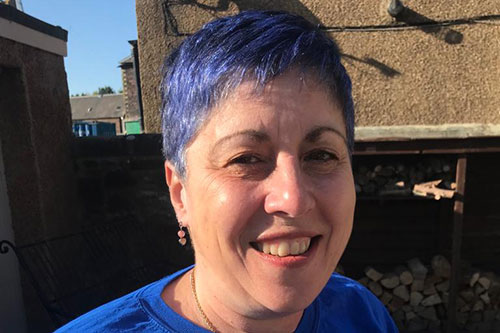Wednesday May 4th 2022

A mum of two from Dalkeith who is facing the onset of Huntington’s disease is speaking out to build greater understanding about the incurable and devastating condition.
Dina De Sousa, a 58 year old retired university researcher, is marking Huntington’s Disease Awareness Month in May by colouring her hair blue and purple, the colours chosen to represent the global Huntington’s disease community.
She hopes the dramatic new look will help to spark conversations and raise awareness about the disease, which devastates so many families, including her own, across the generations.
“Huntington’s disease is a thief that slowly steals your body, energy, health, family, friends and the person you used to be,” said Dina.
“It’s an extremely complex disease that many people wouldn’t talk about. If it was in your family you didn’t tell anybody. There was a lot of stigma because, amongst many other symptoms, it leads to serious mental illness.”
Huntington’s disease is caused by an inherited faulty gene that damages parts of the brain, leading to loss of control over movement and changes to thinking processes and mental health.
Over time, someone with Huntington’s disease will typically develop jerky movements and a loss of ability to walk, talk, eat, drink and swallow. They become unable to make decisions, organise and look after themselves, and may experience mood swings, behaviour changes, anxiety, depression and, for some people, psychosis.
Many families believe their loved one with the disease has been wrongly accused of being drunk or on drugs, while others say they feel isolated in their own communities.
As the disease progresses, 24-hour care can become necessary, meaning people are no longer able to live in their family home.
To compound the toll on families still further, each child of a person with Huntington’s disease has a 50/50 risk of inheriting the faulty gene, meaning they too will go on to have the disease.
This means many young people are growing up watching their parent’s health decline while knowing that they too might develop the same symptoms.
“My late father was diagnosed out of the blue 14 years ago, which was a big shock to us all. He was misdiagnosed for years so we had no idea about our family history.
At the time I thought it was amazing that we didn’t know but now I realise it’s a situation that is sadly all too common,” said Dina.
“I was tested soon after my dad’s diagnosis and the result came back positive for the faulty gene. From that moment, my outlook changed for myself and for our sons who we knew, for the first time, were also at risk. I learned all I could about Huntington’s disease so I could advocate for families and patients, and raise awareness. I retired three years ago so I could focus on my health and do what I can for the Huntington’s community.”
Dina has taken part in many research projects and sits on the Board of the European Huntington Association. Five years ago this month, she joined Huntington’s disease families from across the world at a global gathering at the Vatican organised by Pope Francis. She was Chair of the Scottish Huntington’s Association Lothian Family Branch for many years, fundraising and bringing families together to share experiences and support one another. She is also a Trustee of Scottish Huntington’s Association, the only charity in the country dedicated exclusively to the care and support of families impacted by Huntington’s disease.
It does this through a nationwide network of Huntington’s Disease Specialists, Youth Advisors and a Financial Wellbeing Service that works to reduce the household hardship that exists for many families.
“Over the years, Scottish Huntington’s Association has grown its services in response to the needs of families. Founded by families for families, it is now recognised as being one of the best Huntington’s disease associations in the world,” said Dina.
“But there is a lot more we need to do. We want every family, regardless of where they live in Scotland, to have the specialised care and support they need to cope with this dreadful disease, not just for people who have the disease but also for family members who care for a loved one and those who are at risk.”
To find out more about Huntington’s disease and the work of Scottish Huntington’s Association, visit hdscotland.org